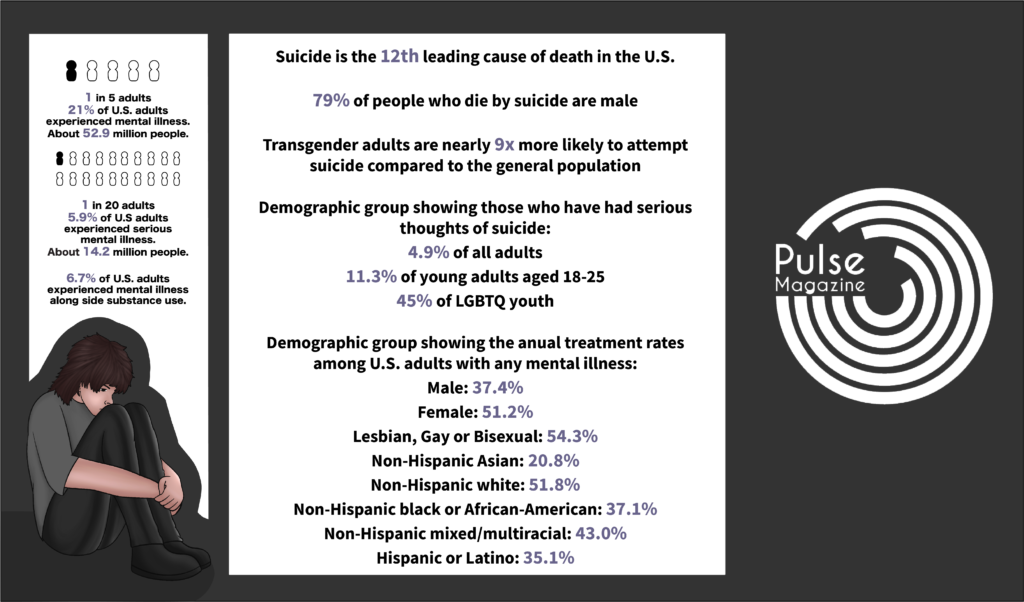Mental Health Series: “Mind and Body need to work as one”
Mental health is important to well-being as it determines a person’s daily functioning.
According to the World Health Organization, mental health is “a state of well-being in which every individual realizes his or her potential, can cope with the normal stresses of life, can work productively and fruitfully, and can contribute to the community.”
Dr. Christopher Albert, Director of the UTRGV Counseling Center, emphasized how important mental health is for maintaining physical health.
“It affects our physical well-being and how we are feeling as well as our behaviors. It affects how we cope,” Albert said. In essence, it shows how people react to new challenges, adapt, and ultimately how to grow.
Well-being is synonymous with positive mental health. It is the idea of enjoying pleasant emotions, happiness, a sense of purpose, and control over one’s life in all human interactions.
According to BioMed Central (BMC), “It is linked to success at professional, personal, and interpersonal levels […] it goes beyond the absence of mental illness, encompassing the perception that life is going well.”
It is important to emphasize that good mental health is not just about constant happiness. Albert indicated that happiness is a sign of well-being, but it is also healthy to feel other emotions. “Working in a state to thrive but still be able to handle feeling emotions,” he said.
He recommends asking ourselves, “Can I be healthy enough to bounce back?” In doing so, it is important to note how one can bounce back.
The Covid-19 pandemic and many other factors have contributed to a wave of adverse mental health issues arising. Abigail Campos, a student from the department of fine arts at the University of Texas Rio Grande Valley, stated, “Relatively speaking, I feel like right now we are all depressed, even if we don’t want to talk about it – we’re all going through something because a pandemic is a difficult time. Even if you didn’t lose anyone, the fact that you had to change your complete lifestyle to accommodate to something that you had legit no say in, no way of preventing it or stopping it.”
Students interviewed agree that worldwide confinement, school, work, family responsibilities, and resuming a social life are all causes of stress, anxiety, and depression. It leads to poor self-esteem, procrastination, and several other obstacles that students must learn to overcome.
The National Alliance on Mental Health shows that nearly 1 in 5 American adults will have a diagnosable mental health condition in any given year. The National Institute of Mental Health, on the other hand, specifies that young adults between 18 to 25 years had the highest prevalence of Any Mental Illness (30.6%) compared to adults aged 26-49 years (25.3%) and aged 50 and older (14.5%).

Therapy and counseling help you cope with traumatic or negative experiences that impede your personal or professional success. It helps deal with issues ranging from family problems, anger management, and grief/loss to sexual assault, eating disorders, and suicidal thoughts.
Healing is not always an easy path. Another senior majoring in Graphic Design, Valeria Jaime, explains, “Therapy isn’t always ‘yes you are right’ it never really is, it’s more like ‘why did you feel that way and how can fix that feeling?’ Because you really can’t control everyone else.”
This process takes determination, time, and patience. The 2017 comedy-drama film “Beatriz at Dinner” shows some light on the concept. When the main character Beatriz finds herself at dinner with political and healthy people, she tries to make them understand their actions. “You think killing is hard? Try healing something,” Beatriz said. “That is hard. That requires patience. You can break something in two seconds. But it can take forever to fix it. A lifetime, generations.”
Individuals have access to therapy, but they must make an effort. “That’s the thing that we forget. We need to put in our two cents”, said Campos. “Don’t make [other people] your source of advice all the time.”
On this account, the UTRGV Counseling Center strives to put itself out there so more students can get the help they need. Albert estimated the number of students seeking counseling is about 1200 to 1500, but surveys determined that more students needed to go to their services to get help.
The sooner the student gets counseling, the better. The 24/7 Crisis Line is always available for those who need it, https://www.crisistextline.org/, “You are never alone,” Albert concluded.





